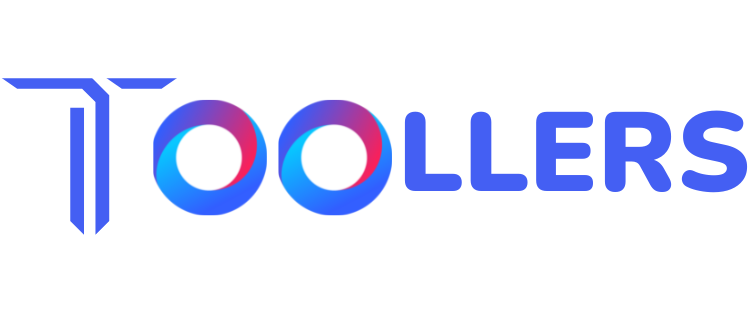Email marketing continues to be one of the most effective ways for businesses to reach their target audience. In fact, email marketing has an average ROI of $42 for every $1 spent (source: Campaign Monitor). With such impressive returns, it’s no wonder that businesses large and small are investing heavily in the right email marketing solution.
As the digital landscape evolves, so do the tools that help businesses reach their customers. Email marketing software has come a long way, offering everything from automated campaigns to advanced analytics, integrations with CRMs, and even AI-driven personalization. Choosing the right tool can significantly enhance your email marketing strategy and make your campaigns more effective, efficient, and scalable.
In this article, we’ll explore the best email marketing software for 2025, diving into their key features, pros, and ideal users. Whether you’re a small business owner or a seasoned marketer, these tools will help you streamline your email campaigns and engage your audience like never before.
How We Analyzed the Best Email Marketing Software
To bring you the most accurate and reliable list of the top email marketing software for 2025, we employed a comprehensive evaluation process. Our analysis combined hands-on testing by our R&D team with insights from external references and reviews, ensuring a well-rounded and unbiased assessment of each tool.
1. Hands-On Testing by Our R&D Team
Our dedicated Research and Development (R&D) team conducted rigorous testing of each email marketing platform to evaluate its real-world performance, features, and overall usability. We tested these tools across various scenarios, such as designing campaigns, segmenting email lists, automating workflows, and analyzing results. This hands-on approach allowed us to evaluate how each platform performs in practice, how easy it is to navigate, and whether it truly delivers on its promises in terms of features, deliverability, and customization.
2. External References and Reviews
To further ensure objectivity, we also analyzed feedback and ratings from trusted review platforms such as G2, Capterra, and Trustpilot. These platforms provide real user experiences, allowing us to gather insights into the tools’ performance, customer satisfaction, and any potential issues. By blending our internal testing with external feedback, we gained a more complete understanding of how each tool works across different business environments and user needs.
3. Evaluation Criteria
We assessed each email marketing platform based on the following key criteria:
- Features: Does the tool offer essential capabilities like automation, segmentation, A/B testing, analytics, and email personalization?
- User Experience: Is the tool easy to use and intuitive, making it accessible for both beginners and experienced marketers?
- Customer Support: Does the platform provide responsive customer support, knowledge resources, and training to help users maximize its potential?
- Pricing: Is the platform priced fairly for its feature set, and does it offer good value for money?
- Integrations: Can the tool easily integrate with other platforms, such as CRM systems, social media, and eCommerce platforms, to create a seamless workflow?
4. Why These 7 Tools Were Selected
After thoroughly analyzing all the available options, we selected these 7 email marketing software solutions because they consistently performed well across all evaluation criteria. Each of these tools offers powerful features, user-friendly interfaces, and reliable customer support, making them stand out in the competitive email marketing landscape. Whether you’re a small business owner, a digital marketing agency, or a content creator, these tools are designed to meet your unique needs.
By combining hands-on testing with external insights, we ensured that our recommendations are both practical and trustworthy. This approach guarantees that the tools listed here are truly the best in the market.
Top 7 Email Marketing Software for 2025
These seven platforms represent the best email marketing solutions for 2025, providing everything from simple campaign management to sophisticated automation and CRM integrations.
| Email Marketing Software | Rating (G2) | Pricing | Key Features | Call to Action (CTA) |
| Systeme.io | 4.8/5 |
|
|
Try Systeme.io |
| GoHighLevel | 4.5/5 |
|
|
Start with GoHighLevel |
| Moosend | 4.7/5 |
|
|
Try Moosend |
| AWeber | 4.2/5 |
|
|
Try AWeber |
| Benchmark Email | 4.3/5 |
|
|
Try Benchmark Email |
| Mailchimp | 4.4/5 |
|
|
Try Mailchimp |
| ConvertKit | 4.4/5 |
|
|
Try ConvertKit |
Notes:
- Rating (G2): The rating is based on user feedback and reviews collected from the G2 platform.
- Pricing: Prices are approximate and may vary depending on the plan or promotion.
- Features: Only key features are listed for quick comparison.
- Call to Action (CTA): The CTA links will direct users to the respective platform’s sign-up or trial page.
1. Systeme.io
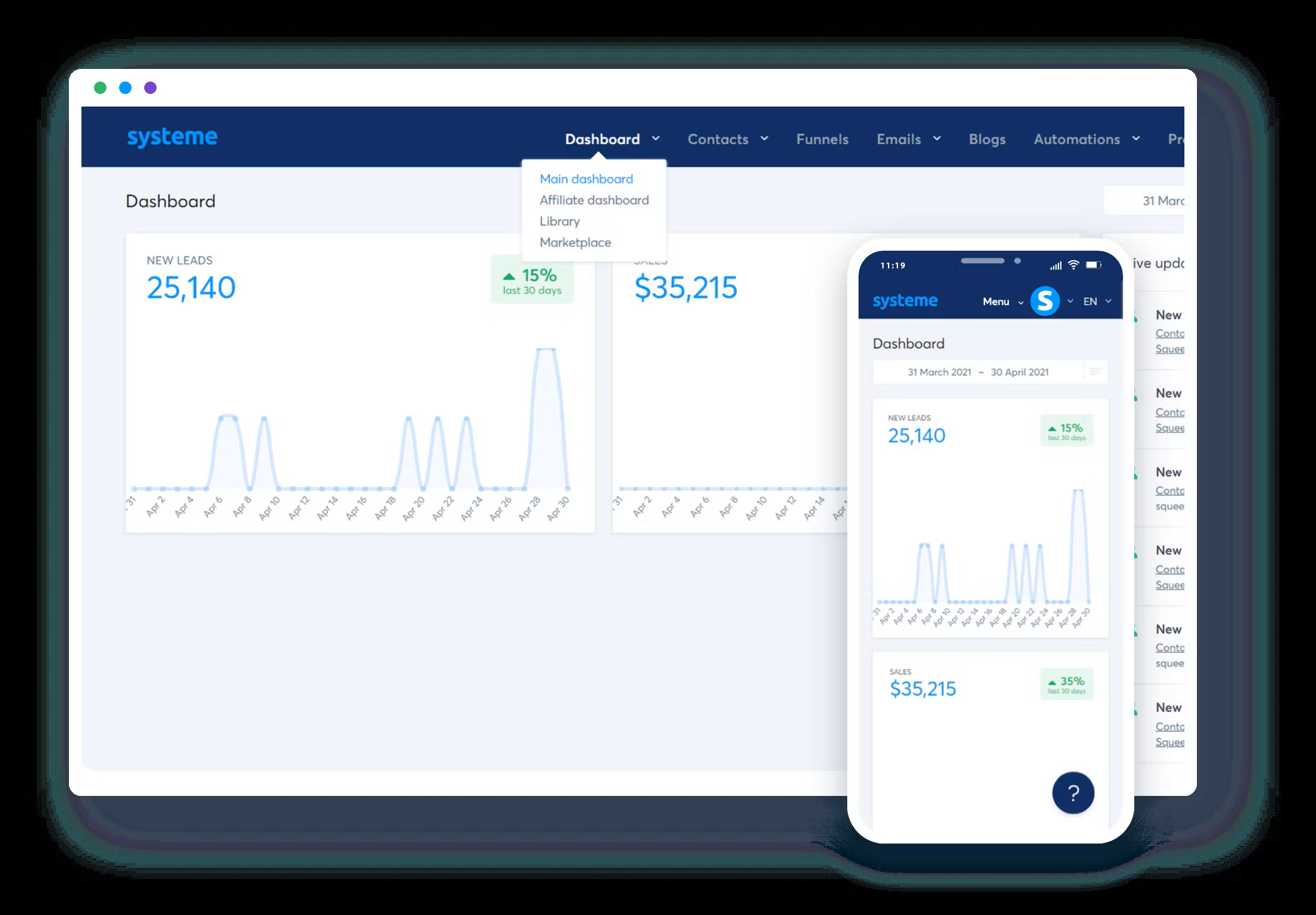
Systeme.io is an affordable, all-in-one marketing platform that caters to small businesses and entrepreneurs. It combines email marketing, sales funnels, course creation, and affiliate management into one comprehensive solution.
Features:
- Email automation, sales funnels, and course creation
- Built-in affiliate marketing system
- Drag-and-drop email builder
- Simple website and blog creation tools
Pros:
- Highly affordable
- Easy to use, especially for beginners
- All-in-one marketing platform
Cons:
- Limited integrations with other tools
- Basic email analytics
Pricing:
- Free: $0
- Startup: $27/month
- Webinar: $47/month
- Unlimited: $97/month
Ideal For:
- Entrepreneurs, small businesses, and startups seeking an affordable and comprehensive marketing solution.
2. GoHighLevel
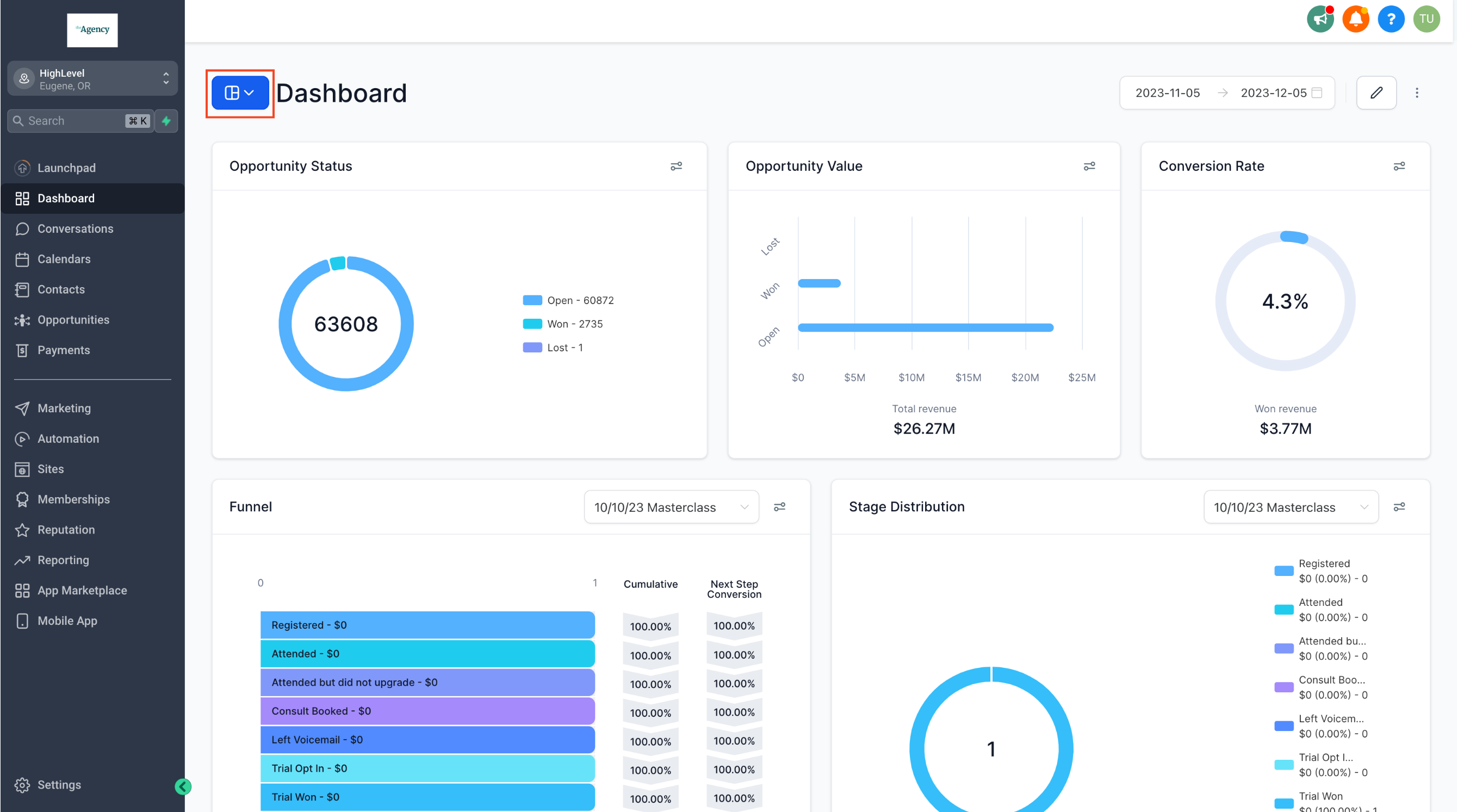
GoHighLevel is a robust marketing platform ideal for agencies and growing businesses. It combines CRM functionality with email marketing, SMS, and advanced automation to manage customer relationships and marketing campaigns.
Features:
- Integrated CRM system
- SMS and email campaign management
- Lead nurturing with automation
- Customizable dashboards and white-label options for agencies
Pros:
- Powerful automation tools
- Scalable for large businesses and agencies
- Good customer support
Cons:
- Steep learning curve for beginners
- More expensive than some alternatives
Pricing:
- Starter: $97/month
- Unlimited: $297/month
Ideal For:
- Digital marketing agencies, marketers, and businesses that need a unified platform for CRM and email marketing.
3. Moosend
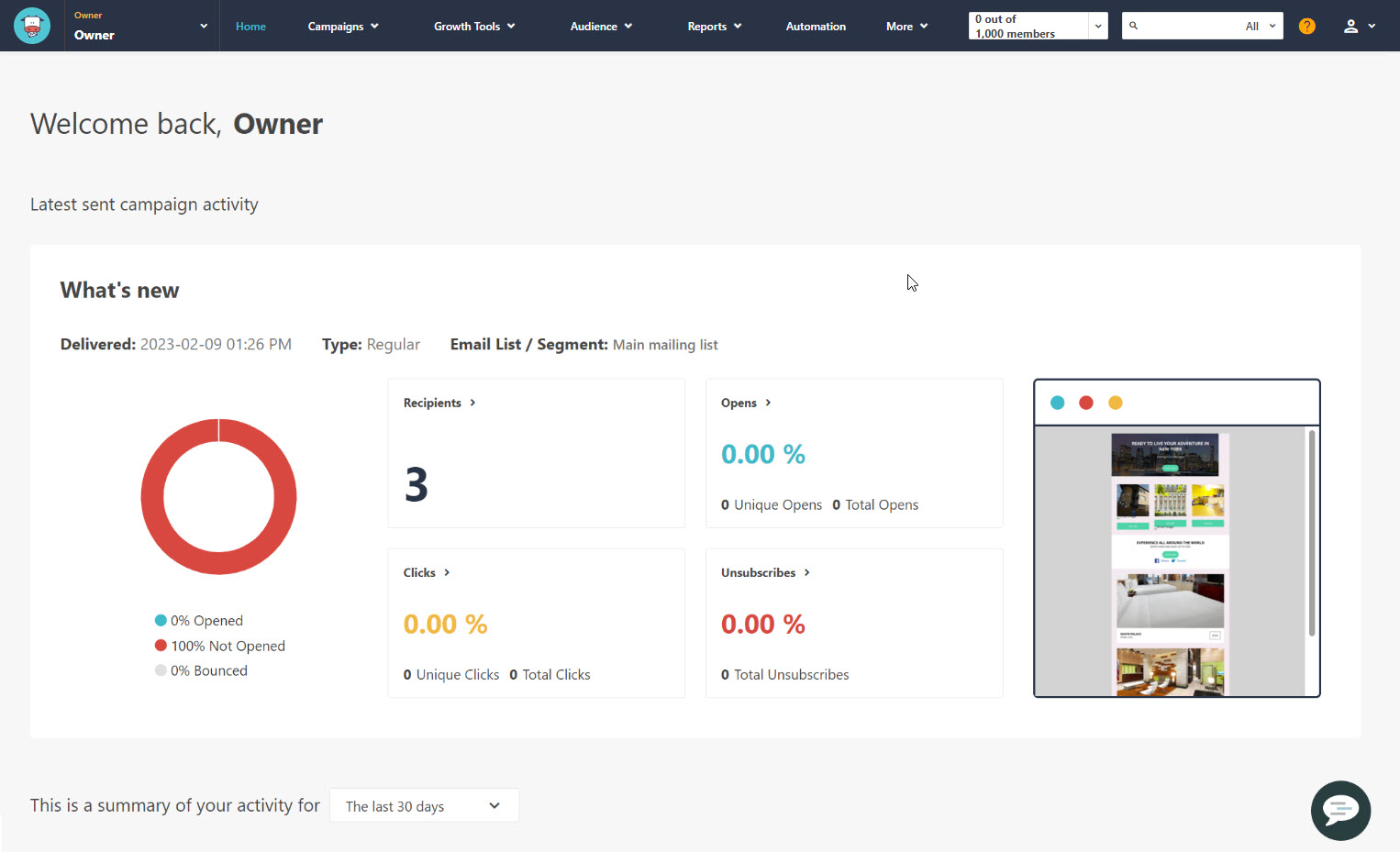
Moosend offers a highly affordable and feature-rich email marketing platform, perfect for small to medium-sized businesses. It provides an easy-to-use interface with powerful automation, A/B testing, and advanced reporting features.
Features:
- Email automation workflows
- A/B testing and advanced reporting
- Segmentation and personalization
- Drag-and-drop email editor
Pros:
- Affordable pricing with robust features
- Easy to use, even for beginners
- Excellent deliverability rates
Cons:
- Limited template options
- Fewer integrations compared to larger platforms
Pricing:
- Pro: $7/Month
- Moosend+: Custom Plan
- Enterprise: Custom Plan
Ideal For:
- Small and medium-sized businesses that need a cost-effective yet feature-rich email marketing tool.
4. AWeber
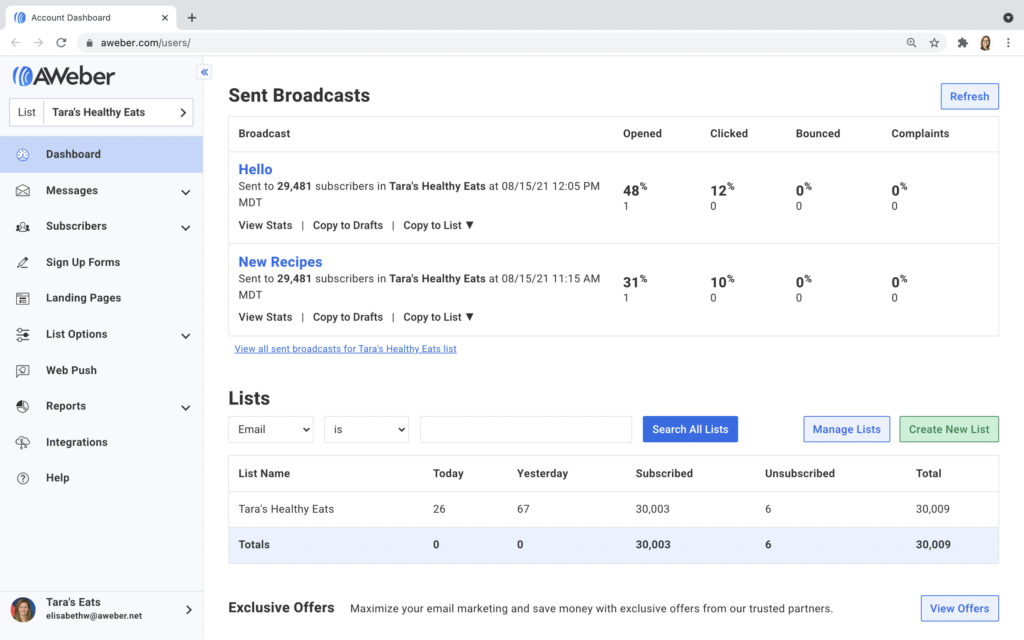
AWeber is one of the most established names in email marketing, offering a variety of features like email automation, templates, and comprehensive analytics. It’s known for its simplicity and long-standing reputation.
Features:
- Drag-and-drop email builder
- Email automation and sequences
- Performance tracking and analytics
- Integration with eCommerce and CRM platforms
Pros:
- Easy-to-use platform with a great user interface
- Excellent customer support
- Reliable and well-established
Cons:
- Limited advanced automation features
- Can be expensive for smaller businesses
Pricing:
- Free: $0/Month
- Lite: $12/Month
- Plus: $20/Month
- Unlimited: $899/Month
Ideal For:
- Small businesses and individuals new to email marketing, looking for a reliable and user-friendly platform.
5. Benchmark Email
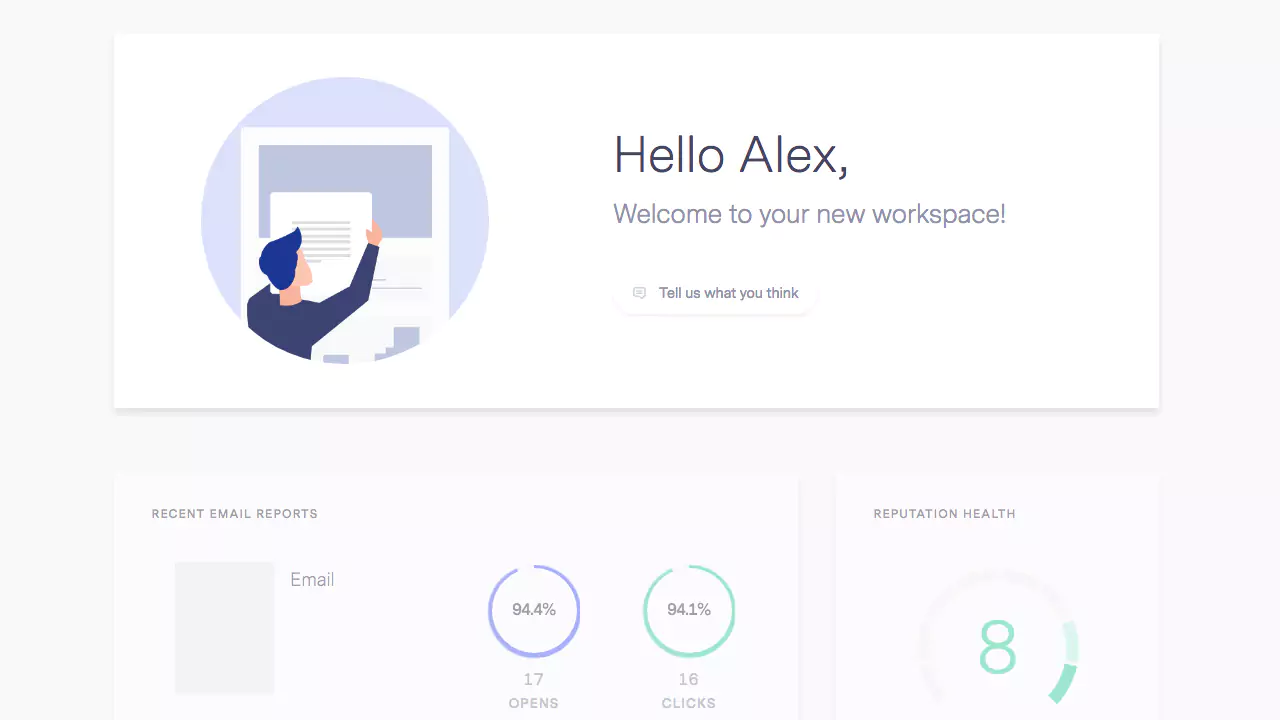
Benchmark Email offers a simple, intuitive interface with powerful design tools and automation features. It’s ideal for businesses looking to create visually appealing email campaigns without requiring design expertise.
Features:
- Customizable email templates
- Email automation and segmentation
- A/B testing and reporting
- Social media and eCommerce integrations
Pros:
- Great for design-focused email campaigns
- Easy-to-use with an intuitive interface
- Excellent customer support
Cons:
- Limited integrations for larger businesses
- Fewer advanced features than some competitors
Pricing:
- Free: $0/Month
- Pro: $13/Month
- Enterprise: Contact Sales
Ideal For:
Small businesses and personal brands that prioritize easy-to-create, visually appealing campaigns.
6. Mailchimp
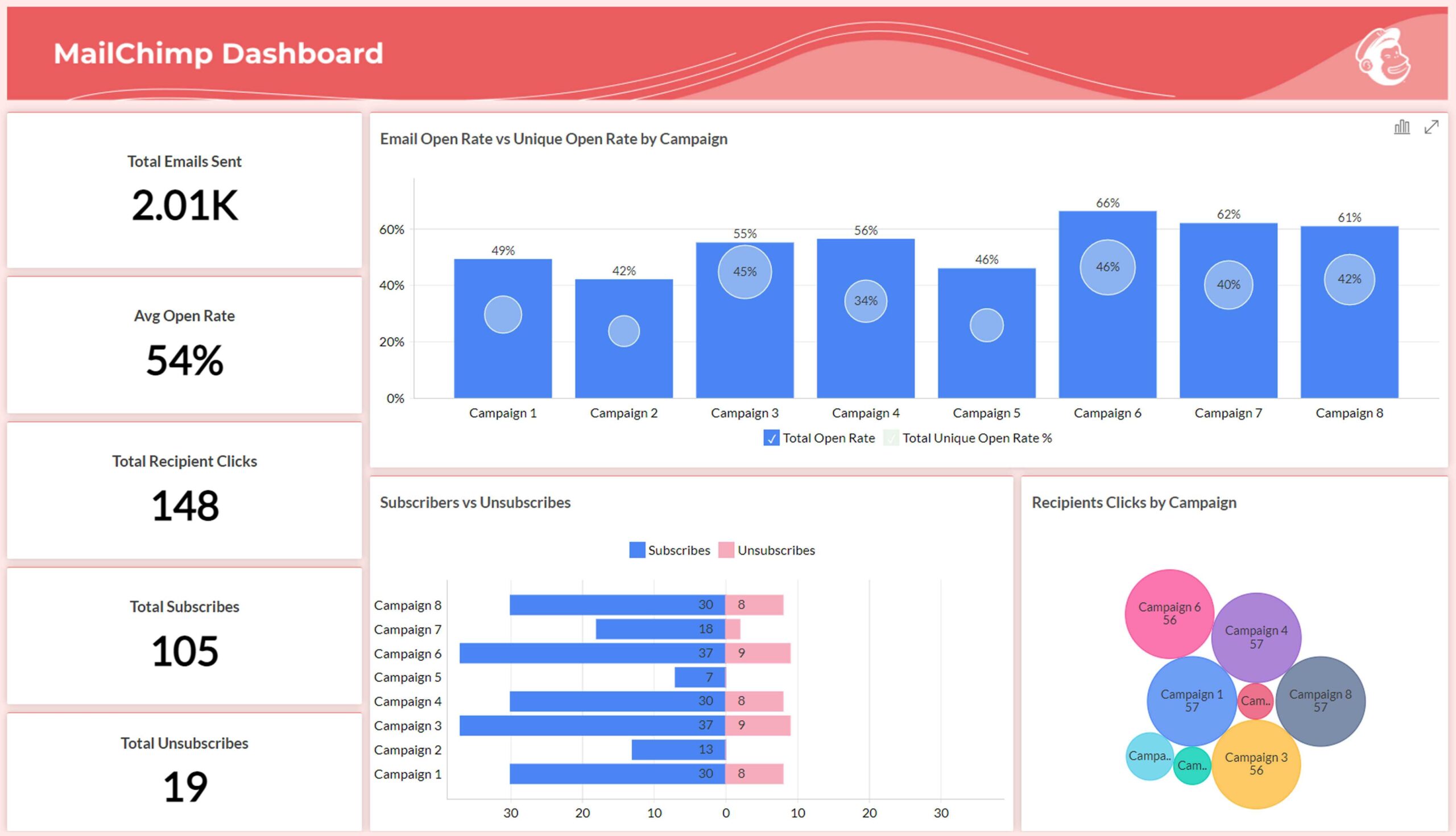
Mailchimp is a versatile, widely popular email marketing platform known for its powerful features, flexibility, and scalability. It’s suitable for businesses of all sizes, offering everything from email design to advanced analytics.
Features:
- Email design tools and templates
- Automation, segmentation, and personalization
- Detailed analytics and reporting
- Integration with eCommerce, CRM, and social media platforms
Pros:
- Excellent free tier for beginners
- Highly flexible and scalable
- Strong community and support resources
Cons:
- Pricing can get expensive as your list grows
- Some features can be overwhelming for beginners
Pricing:
- Standard: $6/Year
- Premium: $131/Year
Ideal For:
- Businesses of all sizes looking for a well-rounded, scalable solution for email marketing.
7. ConvertKit
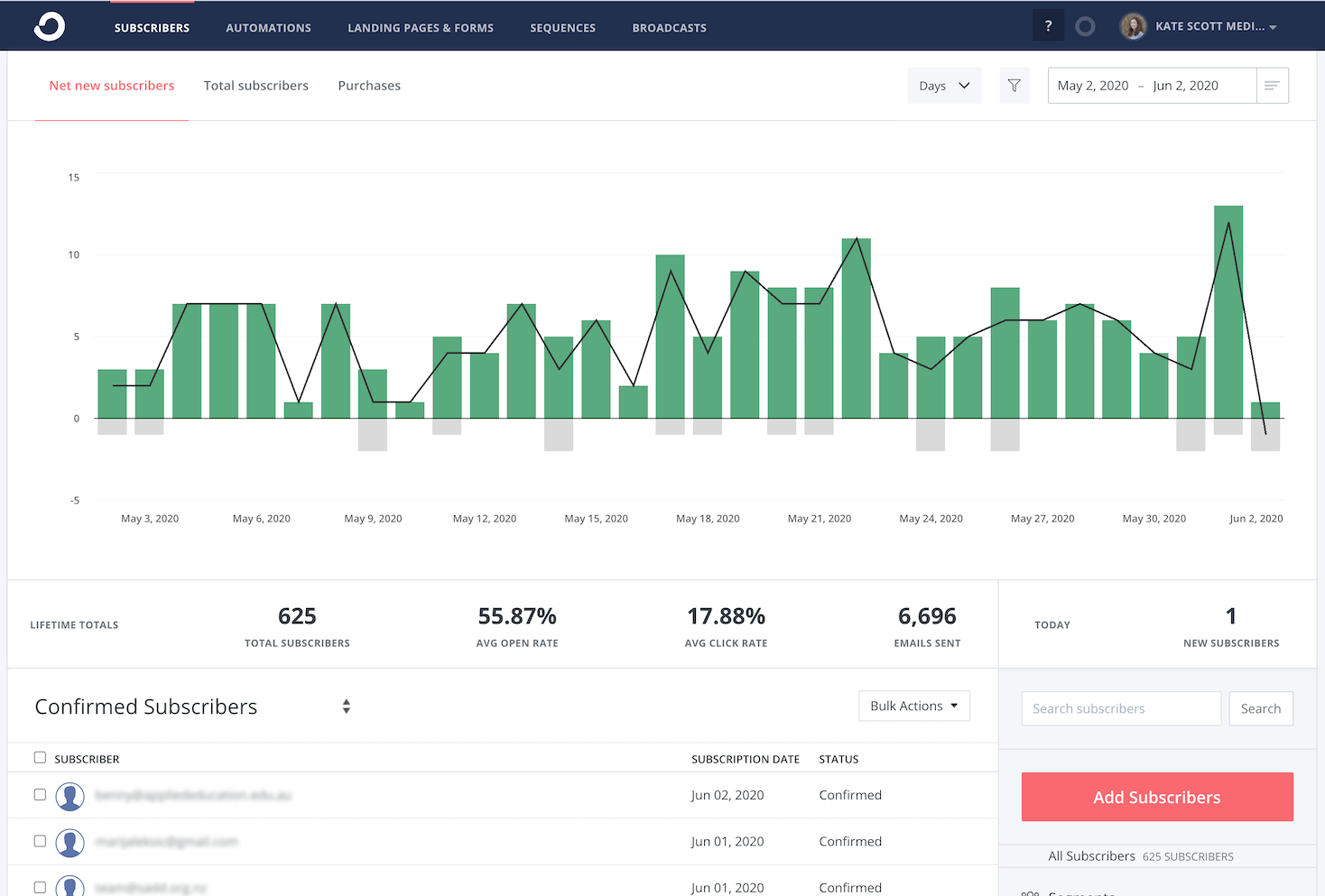
ConvertKit is designed specifically for content creators, bloggers, and influencers. It simplifies the process of building email sequences, landing pages, and automating audience engagement.
Features:
- Email sequences and automation
- Landing page builder and forms
- Advanced tagging and segmentation
- Easy-to-use interface for creators
Pros:
- Ideal for bloggers, influencers, and content creators
- Powerful automation and audience segmentation
- Intuitive and user-friendly interface
Cons:
- Limited design customization options
- Can be expensive for larger lists
Pricing:
- Newsletter: $0/Month
- Creator: $25/Month
- Creator Pro: $50/Month
Ideal For:
- Bloggers, influencers, and content creators who need simple, effective email marketing with automation features.
Who Should Use Email Marketing Software?
Email marketing software is a powerful tool for any business, regardless of size or industry. Here are some examples of who can benefit most from these tools:
1. Small Businesses vs. Large Enterprises
Small businesses benefit immensely from email marketing software because it allows them to reach a larger audience with minimal investment. Large enterprises, on the other hand, require more sophisticated tools to manage vast customer lists and complex campaigns, which is where advanced email marketing platforms come in.
2. Content Creators, Bloggers, and E-Commerce Stores
For content creators and bloggers, email marketing is a way to build and nurture relationships with followers. E-commerce stores can leverage email marketing to send product recommendations, promotions, and abandoned cart reminders.
3. Non-Profits and Educational Organizations
Non-profits can use email marketing to drive donations, while educational institutions can keep their audiences informed about upcoming courses or events.
What Features to Look for in Email Marketing Software
When evaluating email marketing software, there are several key features to consider:
- Automation and Personalization: Personalizing emails can boost engagement. Look for tools that allow you to send triggered emails based on user behavior.
- Templates and Design: Many platforms offer customizable templates to make it easy to design professional-looking emails without coding.
- Analytics and Reporting: Accurate tracking is essential for improving your campaigns. Features like A/B testing and detailed reports can help you refine your strategy.
- Integration with Other Tools: Consider whether the software integrates with your CRM, eCommerce, or social media platforms.
- Deliverability Rates: Ensure that your emails land in your customers’ inboxes, not their spam folders.
- Pricing and Free Trials: Many platforms offer free trials, so you can test the features before committing to a paid plan.
How to Choose the Right Email Marketing Software for Your Needs
Selecting the right email marketing platform depends on your business needs. Here are a few tips:
- Consider Your Business Size and Industry: Choose software that suits your business type, whether you’re a small eCommerce store or a large enterprise.
- Ease of Use vs. Features: Balance ease of use with advanced features. A user-friendly interface is essential, but more complex tools might be necessary as your business grows.
- Support and Community: Look for responsive customer support and an active user community.
- Budget and Scalability: Think about your long-term goals. Can the platform scale as your business grows?
- Integration Needs: Check how well the software integrates with your existing tools, such as CRM or eCommerce platforms.
Conclusion
In conclusion, choosing the right email marketing software can transform your business’s marketing strategy. Whether you need advanced automation, CRM features, or simply a reliable platform for creating beautiful email campaigns, there’s a tool that suits your needs. The seven platforms reviewed here—Systeme.io, GoHighLevel, Moosend, AWeber, Benchmark Email, Mailchimp, and ConvertKit—are all excellent choices for 2025.
Each platform offers unique features and advantages, so consider your business’s size, needs, and budget to make an informed decision. Once you choose the right software, you’ll be on your way to launching more effective and impactful email campaigns.
FAQs: Common Questions About Email Marketing Software
1. What is the most successful customer email marketing software?
The most successful email marketing software varies depending on the use case. Mailchimp and ConvertKit are popular for content-driven businesses, while GoHighLevel and Systeme.io excel in CRM and agency use.
2. Can I start with free email marketing software?
Yes, platforms like Mailchimp and Benchmark Email offer free plans that are great for startups and small businesses just starting their email marketing journey.
3. How important is automation in email marketing?
Automation is crucial for improving efficiency, targeting specific customer segments, and driving higher engagement rates. Personalized emails sent automatically lead to higher conversions.
4. Is email marketing software necessary for small businesses?
Absolutely. Even small businesses benefit from using email marketing software, as it enables them to reach customers efficiently, manage campaigns, and analyze performance without the need for large marketing teams.
